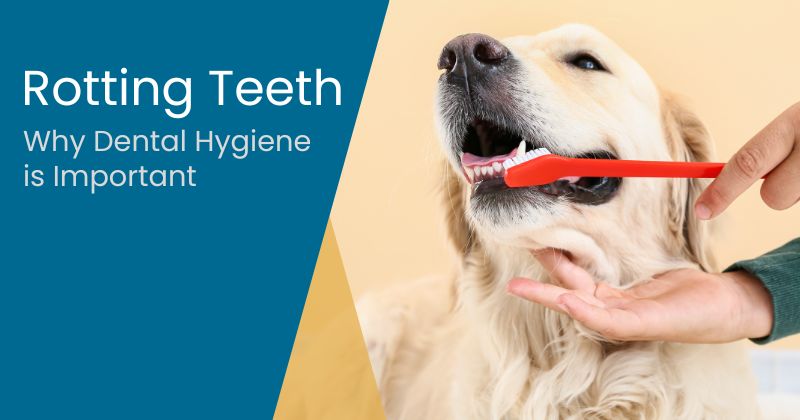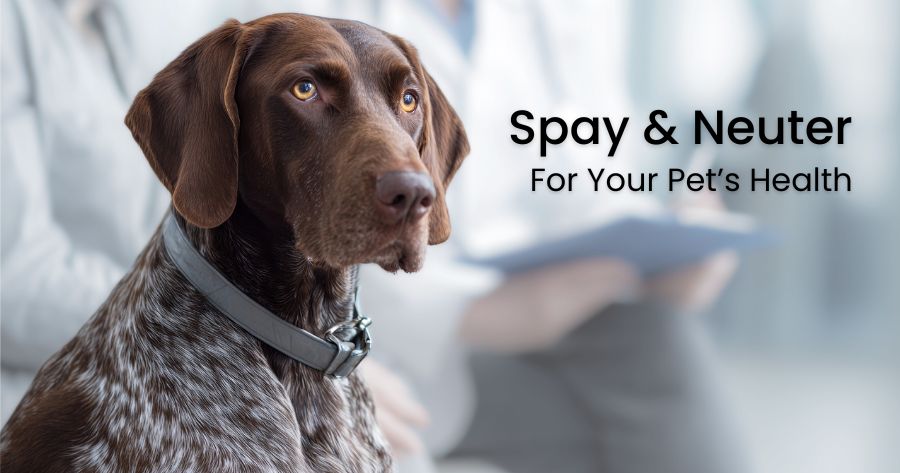
As a pet owner, you want to ensure your dog lives a long, healthy life. One aspect of their well-being that often goes overlooked is dental health. If your dog’s teeth are rotting, they may be suffering in ways that aren’t immediately apparent. Dental issues can lead to pain, infections, and even more severe health conditions. Recognizing the signs early and seeking dental treatments can make a significant difference in your dog's quality of life. At Conyers Animal Hospital, we understand the importance of proactive dental care for your canine companion. If you notice any issues, contact us at (770) 483-1551 or request an appointment online.
Rotting teeth in dogs, also known as dental decay or periodontal disease, is a common issue, especially in older dogs. Several factors contribute to this condition, including poor dental hygiene, improper diet, and genetics.
These factors combined can result in painful conditions if left untreated, highlighting the importance of routine dental care.
Knowing the signs of rotting teeth can help you act before the problem becomes too severe. Here are some key indicators to watch for:
The consequences of dental decay go beyond the mouth. In dogs, rotting teeth can lead to various systemic health problems. When bacteria from infected teeth enter the bloodstream, they can cause infections in vital organs such as the heart, liver, and kidneys. This is known as bacteremia and can lead to serious conditions like endocarditis, which affects the heart valves. Additionally, untreated dental disease can weaken your dog’s immune system, making it harder for them to fight off other infections. Chronic pain from rotting teeth can also reduce your dog’s energy levels, alter their behavior, and negatively impact their overall well-being.
There is a strong link between dental health and organ function in dogs. When bacteria from rotting teeth spread through the bloodstream, they can damage vital organs. For example:
By treating dental decay early, you can protect your dog’s overall health and prevent these serious complications.
Brushing at home is important for dental hygiene, but it won’t treat advanced decay. Professional cleanings at Conyers Animal Hospital remove plaque and tartar below the gum line. These cleanings include scaling and polishing to prevent buildup. For severe decay, treatments like tooth extractions or root canals may be needed to relieve pain and prevent complications. Our team will assess the decay and recommend the best treatment plan for your dog.
A professional dental cleaning involves several steps to ensure your dog’s teeth are thoroughly cleaned:
The best way to prevent rotting teeth is through a combination of regular at-home care and professional dental treatments. Brushing your dog’s teeth daily can significantly reduce the risk of plaque buildup and subsequent decay. Use a toothbrush and toothpaste designed specifically for dogs, as human toothpaste can be harmful to them. Offer your dog dental chews or toys to help scrape away plaque and stimulate their gums. These chews are formulated to clean your dog’s teeth as they chew, reducing tartar accumulation.
Even with diligent home care, regular dental exams are necessary to catch problems early. Annual or bi-annual check-ups allow your veterinarian to monitor your dog’s dental health and recommend professional cleanings as needed. Dental X-rays may also be taken during these exams to detect any underlying issues that aren’t visible during a routine check. At Conyers Animal Hospital, our dental services are tailored to your dog’s individual needs.
While regular cleanings and check-ups are essential for preventing decay, there are times when immediate dental care is necessary. If your dog’s teeth are visibly rotting or they show signs of severe pain, don’t wait for their next annual exam. Symptoms such as bleeding gums, broken teeth, or extreme bad breath require prompt attention from a veterinarian. Delaying treatment can lead to more severe health issues, including abscesses and systemic infections. The sooner your dog receives care, the better their chances of avoiding complications.
At Conyers Animal Hospital, we provide comprehensive dental care for dogs at all stages of life. Whether your dog needs a routine cleaning or more advanced treatments for rotting teeth, our experienced team is here to help. We use state-of-the-art equipment to ensure your dog’s dental health is maintained with the highest level of care. If you suspect your dog’s teeth are rotting or you notice any signs of dental decay, contact us at (770) 483-1551 or request an appointment online. Our team will work with you to develop a treatment plan that meets your dog’s needs.
Closed from 1-2pm daily for lunch
*Saturday Walk-ins available on a first-come, first-served basis. Wait times vary, and you may be turned away if we reach capacity.


